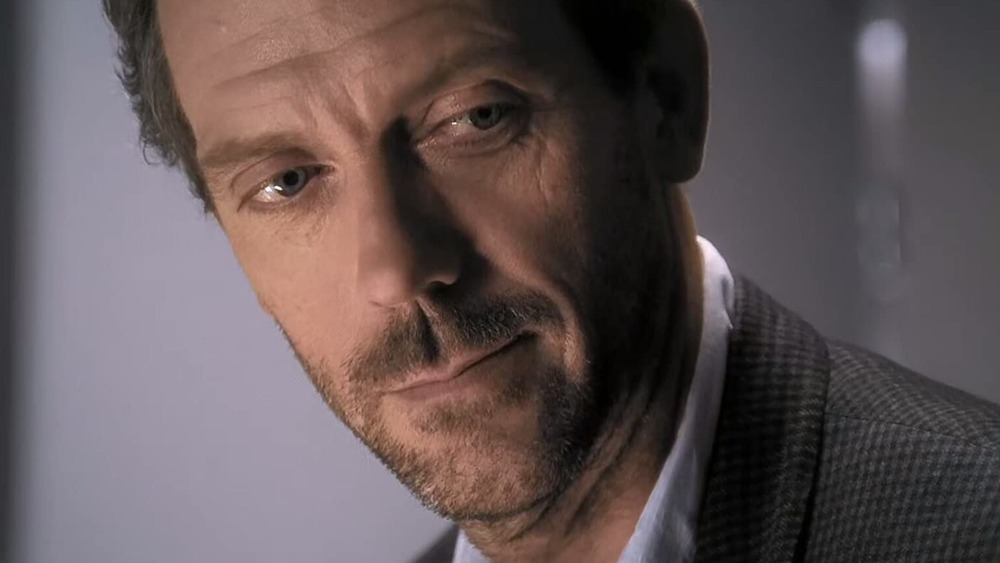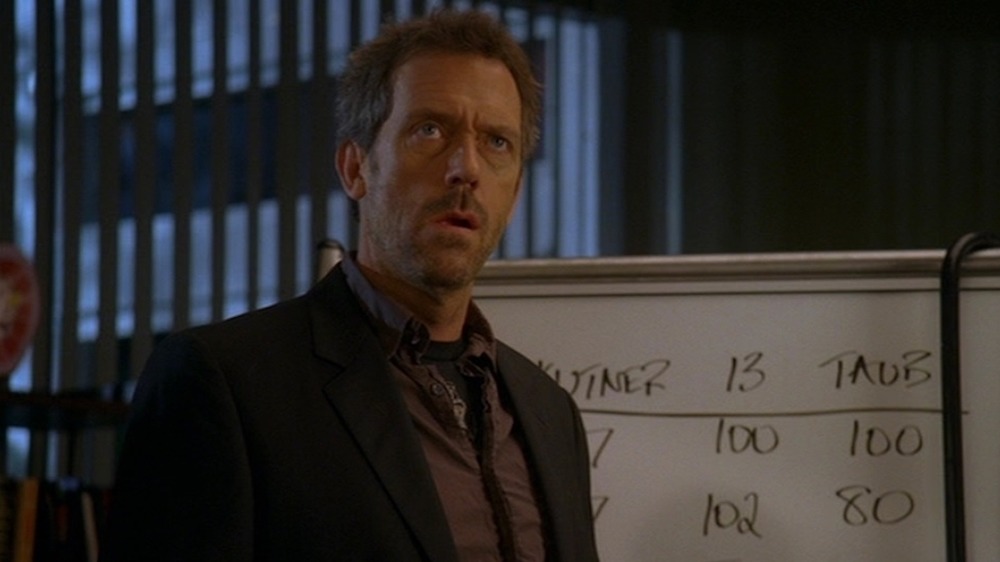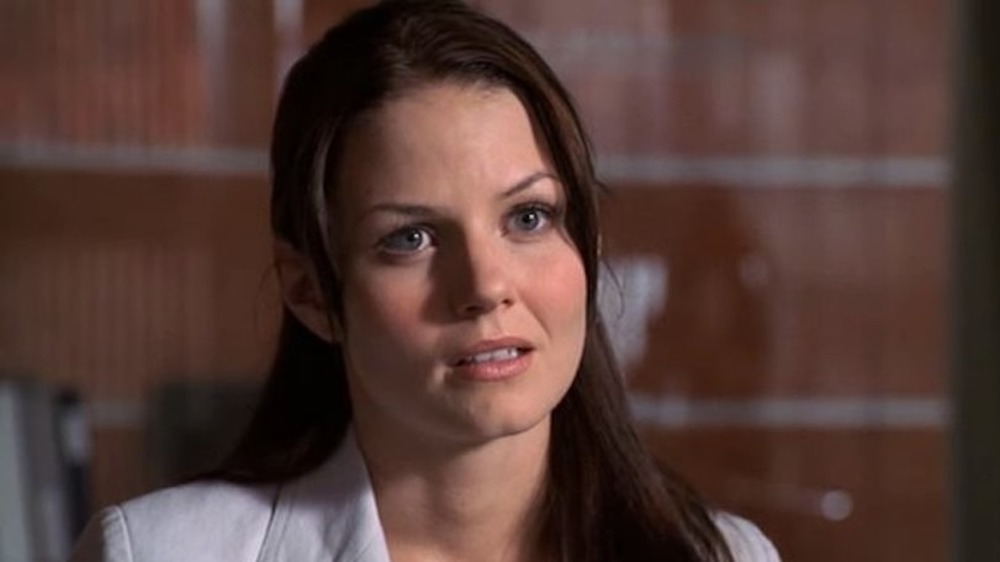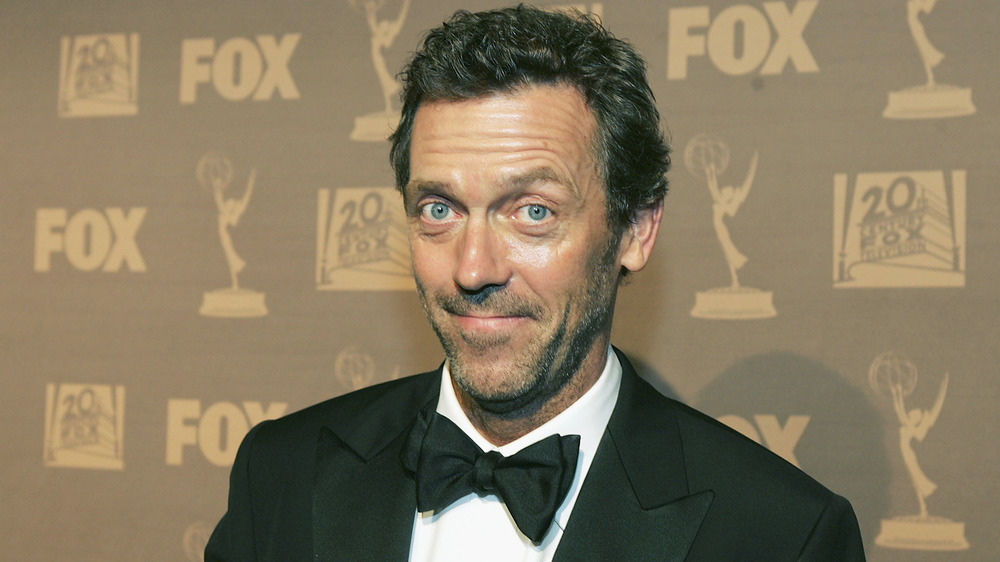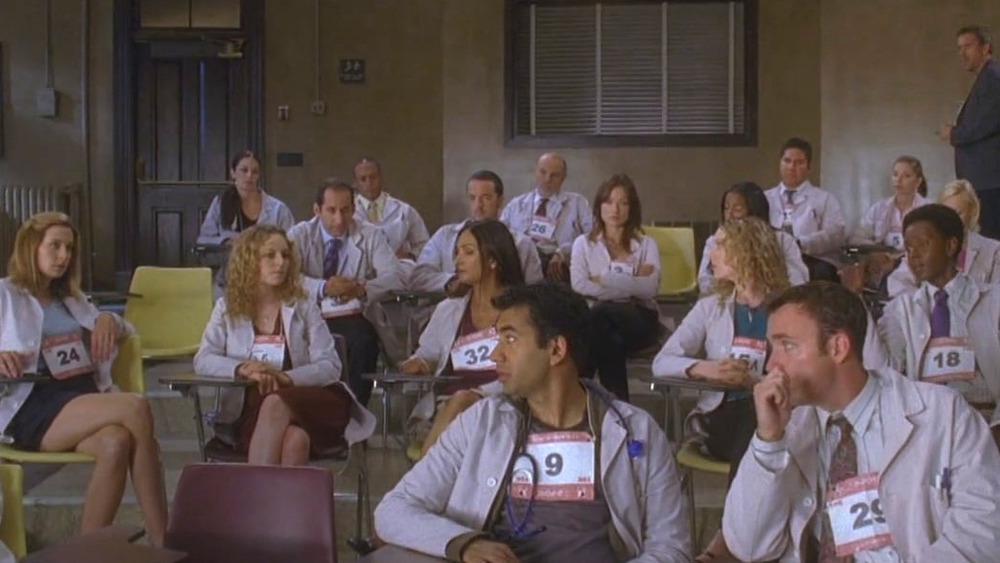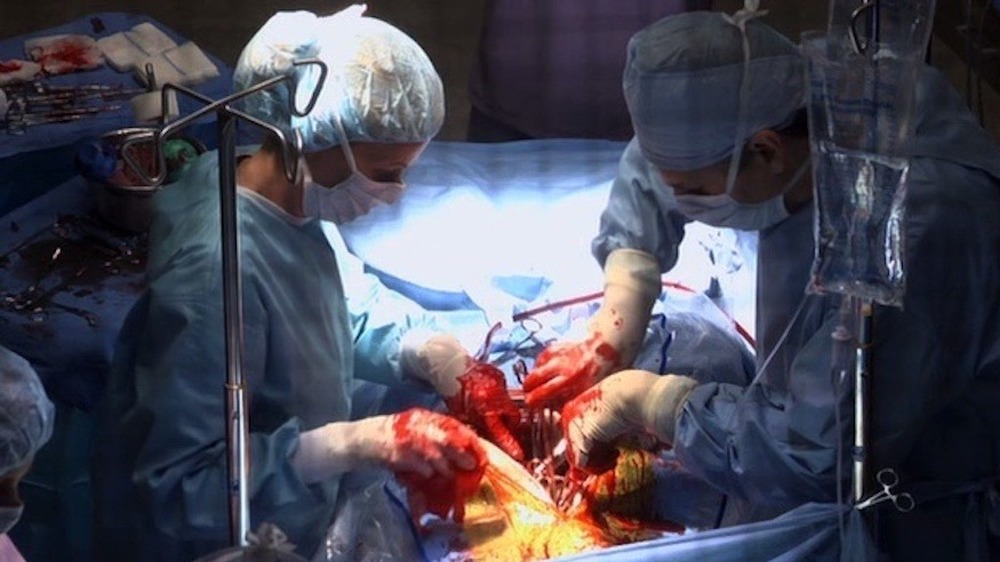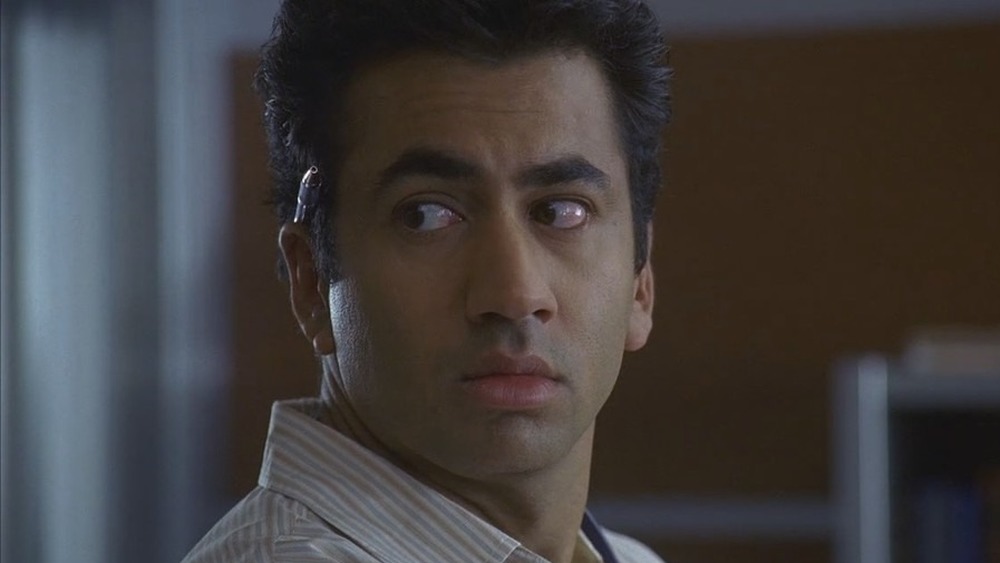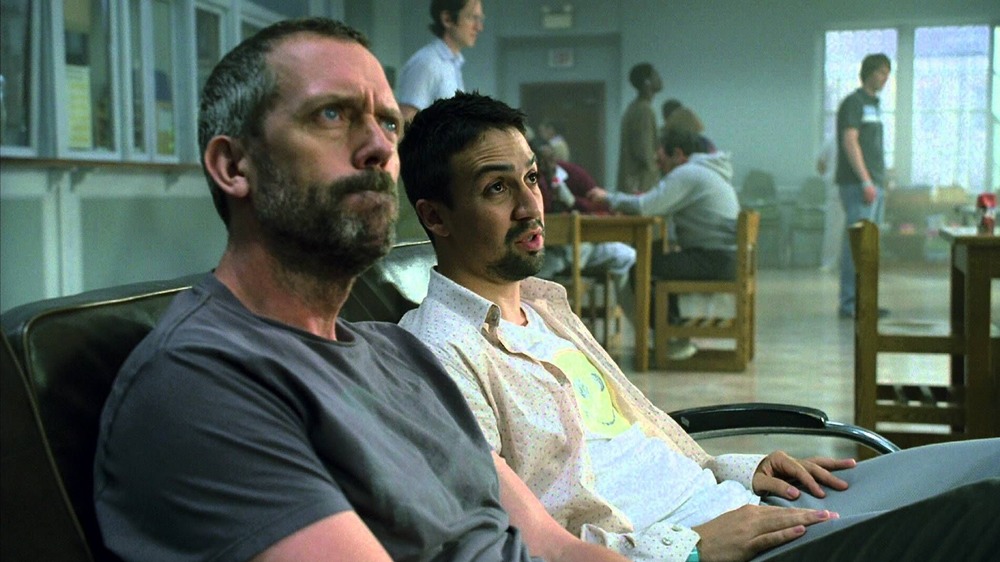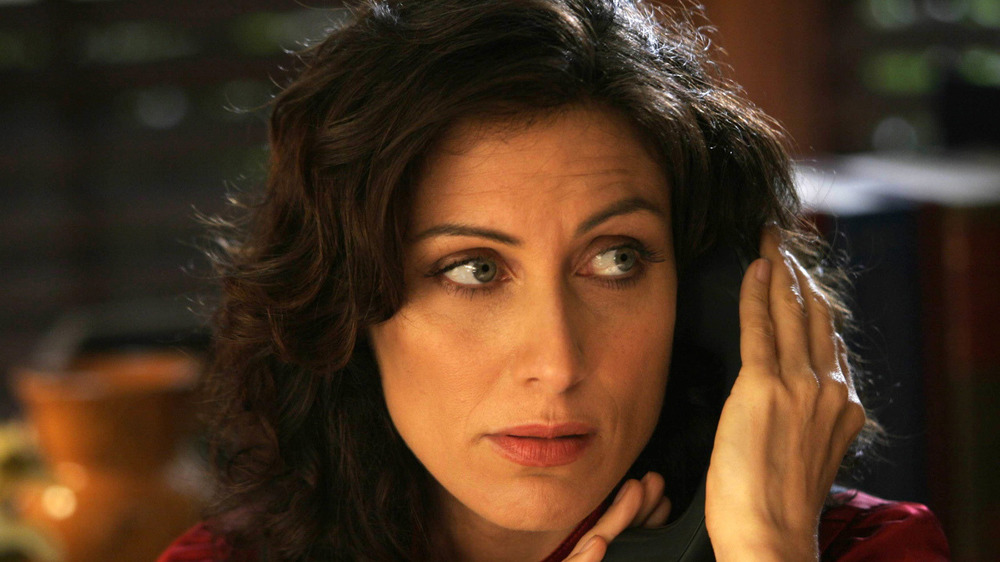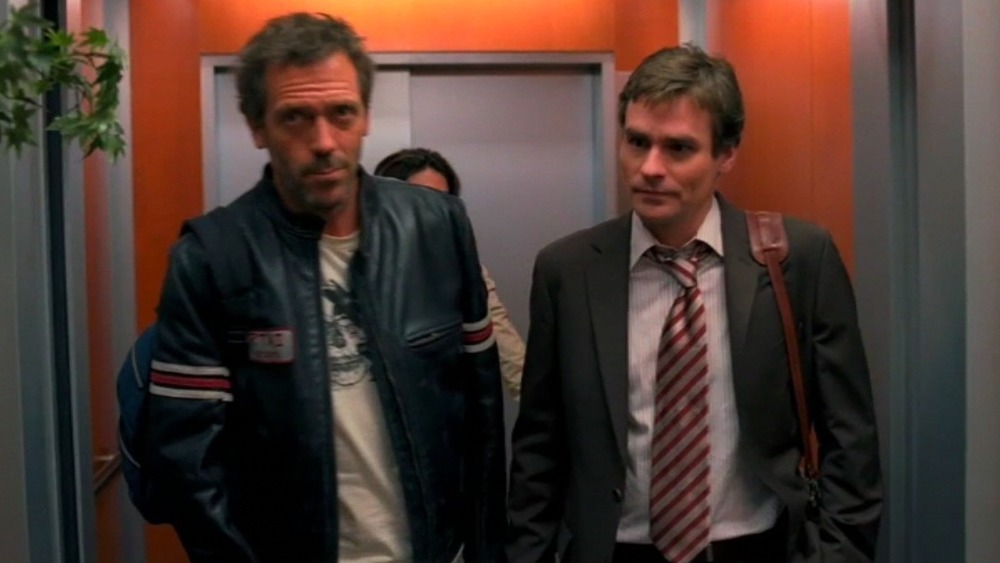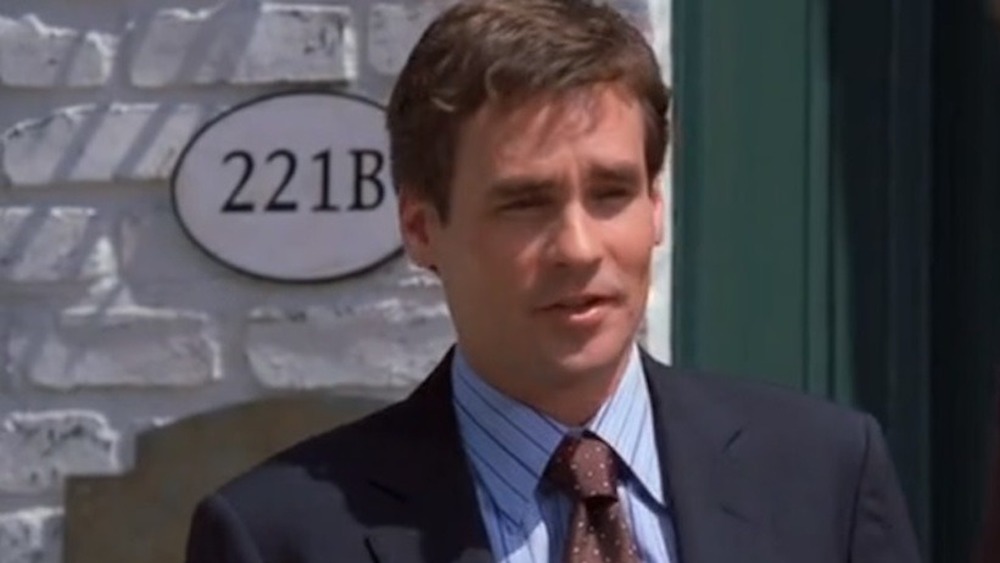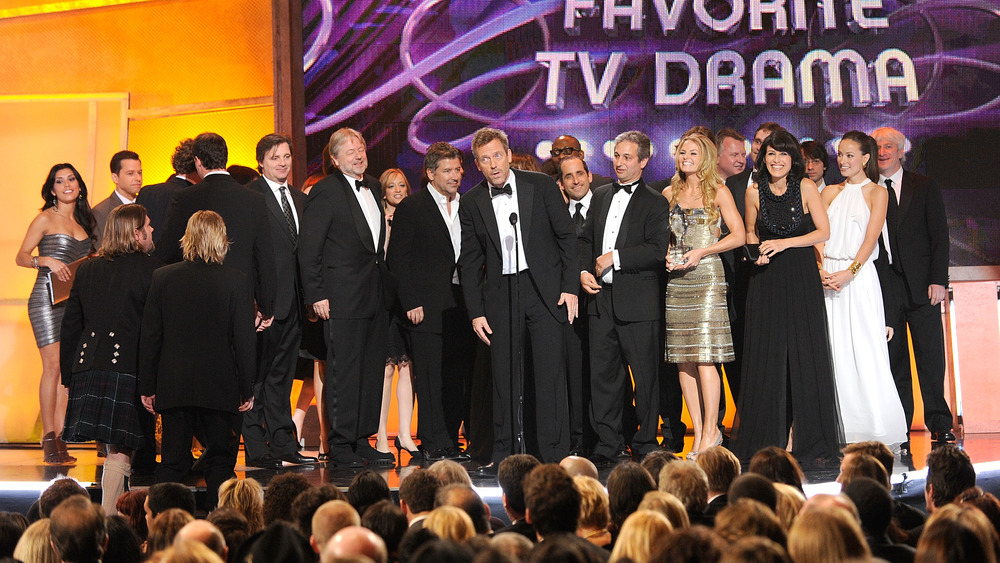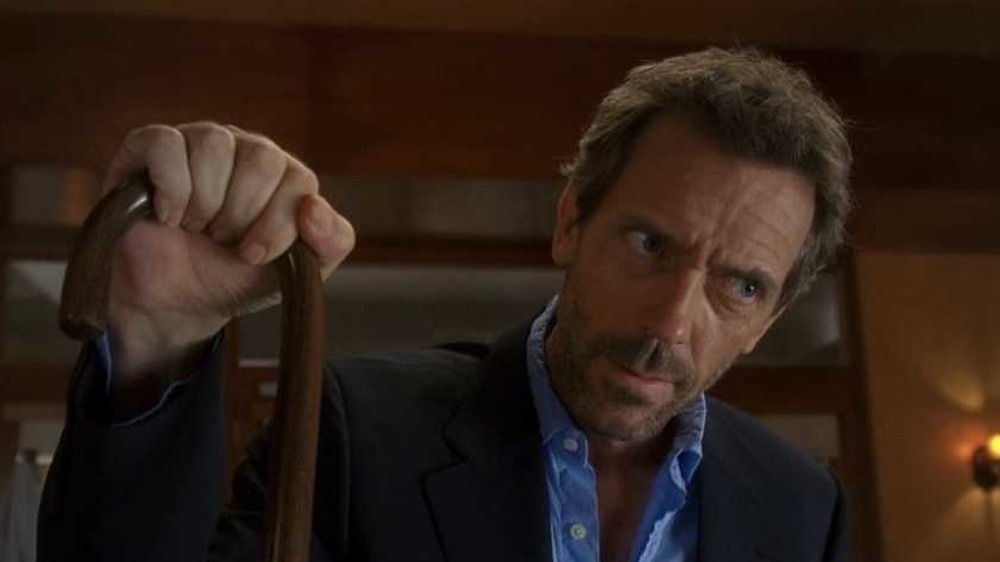The Untold Truth Of House, M.D.
For eight seasons, House was one of the most popular shows on television. It gathered up a variety of awards and nominations, collecting accolades for everything from its sharp writing to its memorable performances. In 2008, it was the top show globally, earning it a spot in the Guinness Book of World Records (Hugh Laurie has the relevant page hanging on the wall of his study). It helped reshape the TV landscape, influenced countless other shows, and reinvented lead actor Hugh Laurie's career. Entertainment Weekly dubbed it one of the top 100 "new classics" of TV, and the Writers Guild of America put it in their list of the 101 Best Written TV Series. Its legacy is secure.
But while the show has become a part of television history, it's far from a dusty relic. It's still a vibrant, entertaining drama that people are talking about. Let's join the conversation and look at the untold truth of House, M.D.
Making a medical mystery meant delving into both genres
House hit the ground running with so much confidence that it's hard to believe the show had to make up its format as it went along. It was pulling from two completely different TV playbooks: the medical drama and the mystery procedural.
In an interview with TV Guide, executive producer Katie Jacobs explains how the show stemmed from a magazine column: "Basically, it lists a series of incongruous symptoms... and then it took 1,200 words to discover the mystery of what the diagnosis was. It was as simple as that — the notion of a medical mystery with the symptoms as the suspects." It was a premise that instantly hooked the network executives, but creator David Shore was nervous about how it would work on a week-to-week basis. Did they have a show, or did they just have a good pitch? He told TV Guide, "Germs don't have motives. People watch mysteries not because of whodunit, but because of 'why done it.'"
So that was their challenge: make the "why" riveting enough that viewers wouldn't change the channel. Diseases don't have motives, but people do — and that's how the show wound up with a focus on how patients would often lie or omit important information. Episodes could hook audiences with one big question: Why would someone lie with their life at stake? What could be that important? What are we missing?
Two Jennifer Morrisons and an American Hugh Laurie
Obviously House hinged on, well, House. Finding the right actor was crucial. The producers waded through a lot of audition videos looking for someone who felt right.
As producer Bryan Singer explained in TV Guide's oral history of the show, they combed through a lot of non-U.S. actors at first, but no one jumped out at them: "There wasn't anyone with a strong voice and a magnetic presence." Then they put in Hugh Laurie's tape, and it was immediately clear he had a charisma and delivery that no one else could match. Singer told TV Guide, "I turned to Paul and Katie and I said, 'This is what I'm talking about! This is what we need — an American!' And they looked at me and said, 'He's British.'"
It would become a common mistake. BBC America eventually crowned him one of Britain's most convincing fake Americans.
Laurie wasn't the only cast member who suffered from a case of mistaken identity at first. Singer sent the network three videos of possible Camerons — the compassionate doctor who would be one of House's foils — and was told to quit joking around: He had two Jennifer Morrisons. One video featured her as a brunette, and the other had her as a blonde. Since she had a two-thirds majority over the top three picks for the role, she turned out to be a shoo-in.
Hugh Laurie turned into a sex symbol
Years of terrific comedic performances in England had made Hugh Laurie's reputation. House put a whole new spin on it. It wasn't just a dramatic role — it was a sexy role.
It was a brand new field for him. In a group interview with GQ, Sela Ward revealed that she — as House's ex Stacy — was the first person Laurie had ever kissed onscreen. There wouldn't be too many kisses, no matter how much the audience appreciated them. Laurie himself thinks that part of the appeal is in the withholding and the teasing: "It's strange, but there was very, very little sex in the show — which is why it was sexy." The show could relish the charge of attraction without getting into the messy logistics of bedroom choreography and network restrictions. Sometimes, less is more.
Laurie was baffled by the response his character got — "Even my wife Jo doesn't think I'm sexy," he told Hello Magazine — but no one else was. Jennifer Morrison told GQ, "We, the cast and the crew, all loved when people started calling Hugh 'sexy' because he really is the sexiest. The thing is, he is obviously an incredibly handsome man, but he's also truly a Renaissance man... We all felt he was rightfully endowed with his sex-symbol title."
Laurie might be modest, but after House became a hit, the world's verdict was clear. It really liked what it was seeing.
What happened in the season four shakeup
The upheaval at the end of House's third season — which saw the original team of Foreman, Cameron, and Chase coming to an end — can still shock viewers. It's rare for a successful show to wipe out its own winning formula and start over.
But that was exactly the effect creator David Shore wanted. He told TV Guide, "You want to be ahead of your audience. If you're shaking things up after the audience has asked you to shake things up, it's probably too late."
Shore knew which rules to follow and which to break: He wanted the realism of three-year fellowships only lasting three years, but he had more flexibility when it came to how House would hire the new fellows. House institutes a "game show element," as Shore calls it, where he gradually winnows down an initial 45 candidates down to his top three. It dramatically shook up season four's structure and added new suspense for viewers: Who would make it all the way through? Outrageous... but dynamic. The show never played it safe.
Unfortunately, it was a decision that came with a behind-the-scenes downside. Shore told TV Guide that he felt guilty about the new actors all getting their hopes up: "I realized going along, 'Oh, House isn't just firing people — I'm firing people.'"
Visual effects were one of the show's secret underpinnings
If you think about the visual effects of House, chances are, you're thinking about the whoosh where the camera tracks into a patient's body and shows the inner workings of organs. It's definitely memorable, but it was controversial right from the start. In an initial review of the show, New Yorker critic Nancy Franklin side-swiped them: "I'll bet you didn't know that when your kidneys shut down they sound like bubble wrap popping."
Love them or hate them, the inner-body effects were made thoughtfully and with considerable expertise. As VFX supervisor Elan Soltes explained to AWN, they used a combination of computer effects and latex modeling that gave the sequences a "photoreal" quality to make them more convincing than CGI on its own.
The show's effects don't end there. A huge part of Soltes' job was about making the show's illnesses convincing — and making those efforts invisible: "When people bleed, it's hard on set to get the blood exactly right take after take and to get the blood to match angles... [or if] someone's mouth is distorting because of a stroke, this is all stuff we do that you aren't looking at it and seeing as a visual effect." Viewers can give Soltes credit for much of the show's medical horrors and for catastrophes like bus crashes. The show's reality was in his hands, and his efforts held it together.
Kal Penn's departure was a game-changer
No one — including Kal Penn — expected the way his character, Kutner, would go out.
His exit wasn't planned from the start. But Penn got a chance to work for President Obama's administration, and creator David Shore was willing to bend any planned plotlines to give him that opportunity. Shore told TV Guide, "If he came to me saying, I've been offered an arc on another TV show, I might have said no. But he wanted to do something with his life and I'm not going to stand in his way. I was proud of him for doing that."
Shore decided to use Penn's character's exit to make a point about mental health and to throw a wrench into the show's works. Kutner unexpectedly commits suicide, leaving the other characters grief-stricken and — almost more importantly — confused. Shore explained, "[House] prides himself on having answers for everything and being able to figure out everybody. And yet a person he had worked with for almost two years does something and House is baffled by it." It was a shocking choice, but one with a ton of dramatic potential.
The show didn't waste that drama — Kutner becomes a symbol of everything haunting House. Without his suicide in season five, the show might never have moved on to House in a psychiatric facility in season six.
You can spot a pre-Hamilton Lin-Manuel Miranda
House attracted plenty of high-profile guest stars — including Jeremy Renner and LL Cool J — but for sheer pop culture foreshadowing, it's hard to top Lin-Manuel Miranda's appearances in season six.
When his episodes aired in 2009, Miranda had already created the award-winning musical In the Heights, but his biggest breakout hit — Founding Father rap musical Hamilton — was still ahead of him. He'd debuted a short concept version at the White House only a few months before.
Executive producer Katie Jacobs was a huge fan of In the Heights, Miranda explained in an interview with Playbill, and she offered him a part the writers had tailor-made for him. Miranda, already a fan, eagerly embraced the opportunity. He told Playbill, "When they said they wrote the part with me in mind, they weren't kidding. I play House's roommate in the psych ward, and the best way of putting it is I play Tigger to his Eeyore."
It was a great use of Miranda's enthusiasm and energy. And it was a chance for non-Broadway audiences to get a look at some of his talents. A later interview with GQ reveals just how much his turn on the show meant to him. "I wrote this secret rap after I finished my episode on the occasion of Hugh's Emmy nomination, a 'thank you' for having me along for a small part of the ride," he recalled. "Hugh is just brilliant. Full stop."
Lisa Edelstein made a clean break
For seven seasons, Lisa Edelstein was a major player on House. Dr. Lisa Cuddy was the hospital's administrator and House's love interest in their uniquely tumultuous relationship, making her central to the show's workplace plots and its personal arcs. But a round of budget cuts put a swift, premature end to her tenure.
Edelstein was disappointed at the circumstances, but she swiftly moved on to new opportunities. She told TV Guide that she liked getting to stretch herself artistically and play new kinds of characters after seven years in the same role. She even enjoyed the return of "first-day jitters."
And for her, the end was the end. She hasn't participated in retrospective events like TV Guide's oral history of the show, for example. And in conversation with Bravo, she ruled out returning for any kind of House reunion show and explained that she usually only sees her former castmates when she runs into them coincidentally. It's not acrimony, she said, it's "just [that] everybody's separated."
Since she had to separate earlier than most, she just made the best of it. Not long after she left, she shrugged off TVLine's question about coming back for a final season appearance: "I haven't talked to anyone over there so it would seem unlikely. Who knows what I'll be doing. I have a lot on my plate." Though it may be disappointing for fans, she wants to look forward, not back.
Friendship became the show's emotional linchpin
While House had its share of romances, the show was clear on one thing. It all came down to House and Wilson and their relationship — whatever you wanted to call it.
There's one term we'll avoid so we won't incur Hugh Laurie's wrath: Bromance, he told GQ, is an "idiot word." (No one remind him of this TV Guide cover.) He prefers to say "a great sort of weird romantic love," adding, "I suppose that was the show's central core relationship, and it was irresistible to me." It was partly a mirror of Laurie's real-life relationship with Robert Sean Leonard, who "made [him] laugh an indecent amount." The two have terrific chemistry, and their odd couple relationship is both funny and heartfelt. Over the course of eight seasons, they joke around, argue, stand by each other, betray each other, move in together, and — above all else — always come back to each other.
It all led to creator David Shore's perfect ending. When he broke the finale down for EW, he said, "It's House being with the person he should be with, in some ways... it's Wilson and House riding into the sunset." A traditional ending done in a nontraditional way — that seems entirely fitting for the finale of a groundbreaking show that always went in its own direction.
The show is a stealth Sherlock Holmes adaptation
It's easy to see that House might not have happened without the science-infused procedural of CSI or the medical drama of ER. But it has another important ancestor, too: one the show mostly acknowledges via winks and nudges.
Let's see... a hyper-observant genius obsessed with unraveling mysteries, not interested in most ordinary human interaction, devoted friend with the initials JW. Who comes to mind but Sherlock Holmes? Even House's name is a punning twist on his literary forebear: from "Holmes" to "House." House's Vicodin addiction even parallels Sherlock Holmes' tendency to kill his doldrums with cocaine. The show liked to throw in deliberate Holmes references for knowing viewers to pick up on. For example, the two characters share an apartment number: 221B.
And it's not just that House drew some of its themes and references from Sherlock Holmes. Den of Geek points out that it may have contributed to Holmes' own legacy, too. As Lin-Manuel Miranda told GQ, House helped "spawn a cottage industry of TV imitators — 'troubled genius, but, man, is he/she good at the job.' Throw a rock and you'll hit 50 procedurals like that now." And what show quickly popped up to follow that same pattern? BBC's Sherlock, with its notably abrasive modern Holmes. We think that's more than enough to make House an honorary part of the Holmes family tree.
The cast all have their own imaginary epilogues
When shows come to an end too soon — and when we love them, it always feels like it's too soon — it's hard to resist imagining what might have happened next. And with House, fans aren't the only ones who couldn't help thinking about alternate season nines and far-future epilogues. The cast and crew all have their own ideas, too, and they laid them out to GQ.
Executive producer Katie Jacobs has a pitch for a whole sequel series, in fact. It would grapple with House's new lack of a medical license by stranding him in a small town with no real hospitals: "Essentially, he is the local pharmacist, doctor, psychiatrist, and secret-keeper of that town. It was going to be 13 episodes and out — a very cowboy-ish, Western kind of thing."
Some go even wilder. Hugh Laurie could tell you about House's experimental home distillery, for example: "It's the trippiest tequila you've ever had." Then there's the part where he could become President...
Others stay grounded and wistful. They'll tell you that House went on secretly keeping tabs on his former fellows, who would go on to successes and struggles that feel tailored to their characters. The range speaks to the cast's colorfulness — and to the breadth of tones the show pulled from. And if anyone ever does put together a reunion series, they ought to have plenty of ideas.
We owe some of our favorite antiheroes to Gregory House
House didn't invent the antihero, but it was the flashpoint for a particular kind of antihero, one that quickly became so popular that you could see it on almost every channel.
Flavorwire describes it well as the "unlikable genius antihero." They're jerks — though often charismatic jerks — but they're so smart and skilled that they're indispensable to their employers. The character type has arguably worn out its welcome through clumsy handling and overexposure, but at its best, it's responsible for some of TV's most charismatic and perversely charming leads. You can see them on everything from The Mentalist to How to Get Away With Murder.
And House started the trend. Even the trope's detractors recognize that, as we see in this Guardian article on the trope: "It's all House's fault, of course. Ever since the misanthropic medical magician limped onscreen seven years ago, television's portrayal of antihero super-genius has gone into overdrive."
No matter how many of these characters we see, however, House still stands out. And despite all the imitators, there's something about him that's still inimitable. As the show's executive producer Katie Jacobs puts it in an interview with GQ, "I am personally tired of smart f***-ups, but if House premiered today, I still think it would stand out. Hugh, in that role, circled a square as a complete character — one that's complicated and funny and deep and sexy beyond all get out."
